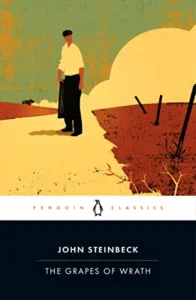The Grapes of Wrath by John Steinbeck 1939
It’s been quite a while since I read a book that stayed in my mind 24 hours a day, always present no matter what I was doing, wondering what was going to happen, thinking about the characters and their world, making me so agitated by the story that I couldn’t read it before going to sleep because of the tension. That’s how I was affected while reading Steinbeck’s classic novel about the Dust Bowl and the migration of the disenfranchised farming families as they headed to the false promised land of California.
There are few characters in American fiction as powerful as Ma Joad and her family. Tractored off their share-cropped farm in Oklahoma, the Joad family—Ma and Pa, the recently paroled Tom, the tom-cattin’ Al, the vaguely brain-damaged brother, Noah, pregnant Rosasharn and her husband, Connie, the little ones Ruthie and Winfield, Uncle John, Gramma and Grampa—and the preacher Casey pile into the truck and head West. They struggle across the country only to find a California overrun with others willing to work for nearly nothing and starving in the process. The Joads were Steinbeck’s personification of the the poverty, heartache, and spiritual death that unregulated capitalism brings to the world as they get caught up in one disaster after another.
Steinbeck in this book that won both the Pulitzer and the National Book Award intersperses chapters that provide brief reflections on the desperation that loss of land, absence of work, hunger, sickness, and loss of hope can breed. The heroic stoicism and hope that is Ma Joad is the only bright light in this darkness.
It’s clear why this is a classic and why Steinbeck, though humbly saying he didn’t deserve it, was a most appropriate Nobel Prize winner in 1962.



